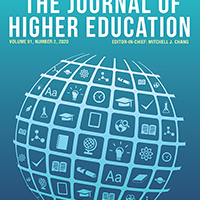Not Waving but Striving: Research Collaboration in the Context of Stratification, Segmentation, and the Quest for Prestige
Item
Title
Not Waving but Striving: Research Collaboration in the Context of Stratification, Segmentation, and the Quest for Prestige
List of Authors
Blanca Torres-Olave; Ashley M. Brown; Lillianna Franco Carrera; & Carlos Ballinas
Abstract
In this article we examine the ways in which institutional stratification and academic labor segmentation contribute to shaping faculty collaborative activities. We draw on interviews from science and engineering faculty at two institutions in the United States to highlight how collaboration, as an essential form of academic labor, is shaped by institutional factors like resource stress and isomorphic pressures to fit the ideal of the 'world-class' research-intensive university. The findings suggest that a university’s relative position in the institutional status hierarchy has a significant impact on the types of resources faculty seeking to establish collaborations can access and mobilize, thus reinforcing existing patterns of institutional stratification where 'striving' institutions can never catch up to their more prestigious peers. At the same time, the pressure to maximize institutional prestige can create paradoxical interinstitutional dynamics where seemingly successful 'Mode 2' units that rely almost exclusively on external resources and partnerships with industry are expected to mold themselves more closely to the activity streams of traditional academic units.
Date
2019
Publication Title
The Journal of Higher Education
Publisher
Taylor and Francis
Identifier
DOI 10.1080/00221546.2019.1631074
Bibliographic Citation
Torres-Olave, B., Brown, A., Franco, L., & Ballinas, C. (2019). Not Waving but Striving: Research Collaboration in the Context of Stratification, Segmentation, and the Quest for Prestige. The Journal of Higher Education, 91(2) 275-299.
